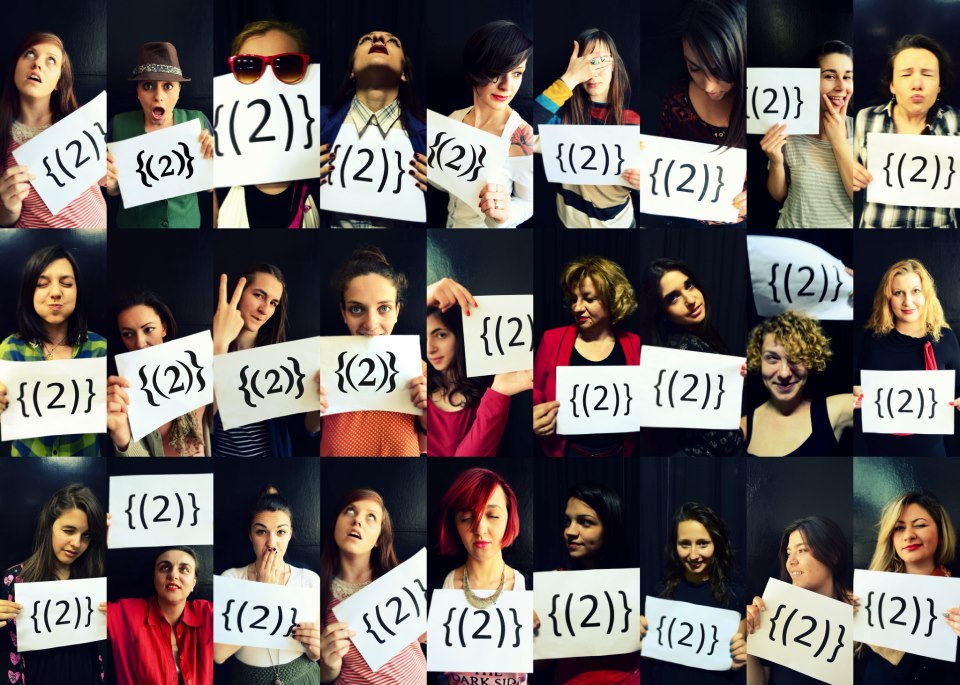Living in Macedonia means that you are free to talk openly about many issues, but you know that the country is still stuck in a limbo where traditional values from the past struggle to remain dominant. The conflict between old and new comes to the surface when matters like gender or sex arise in the public sphere, as for instance when the world-famous play “The Vagina Monologues” is performed for the first time in Skopje, Macedonia.

People here are afraid of the unknown and the unexplored, constantly lurking under the cover of sophistication and contemporary attitudes that come from abroad. I’ve seen that some of the best ways to promote a change in this society are activism projects. That’s why I decided to write this article: I want to present the story of several brave girls, eager to bring new ideas to a society which, although not seeming like it, is still holding onto traditional values.
“I remember the rehearsal of one scene where the actresses mentioned different nicknames for their vaginas, and that day we all understood that there was no place for shyness or discomfort: we had to be open and honest about ourselves”, said Aleksandra Stojanocska, one of the producers of the play in 2011. These Macedonian girls would from that moment on meet to spend their free time discussing vaginas, sex, and rape.
THE MACEDONIAN DEBUT
Indeed, it all started with gender-based violence. The “Vagina Monologues”, a play by Eve Ensler, has travelled the world promoting open debate about this taboo, as well as others. Usually performed by local amateur actors, it had its Macedonian debut in 2011, the first attempt to bring issues such as violence against women closer to the main public in Macedonia, in an “unique chance to be the women’s screaming voices”, adds the other producer, Aleksandra Simoska. A moment “to break the silence and share their pain, giving our support, faith, but also anger, sympathy… and very often tears.”
There was no danger of the play arriving in my country without drawing any attention. The hour and a half was full of sharing and memories, and judging by the more than 300 hundred people in the audience, had a great impact.

These girls would from that moment on meet to spend their free time discussing vaginas, sex, and rape.
All of a sudden everybody knew about some girls wearing red and black outfits talking about vaginas. The pictures were everywhere to prove the existence of the Monologues. People cared, and the two Aleksandras found energy to continue their campaign for female empowerment in their native country. The next step was the V-day.
V-DAY

The girls haven’t stopped: a new play will take place later this year, and in February 2013, they organised the One Billion Rising, an event that took place in more than 160 countries on Valentine’s Day. They tried to turn the spotlight from this so clichéd day of romance to gender-based violence, but unfortunately the local media did not pay much attention. This didn’t however seem to demotivate them, but rather gave them more enthusiasm to keep up the good work.
“These themes are still taboo in Macedonia, but we know that with projects like these we can break the silence and talk openly about gender issues, shake up the general opinion in society about sexual equality and create a sense of openness to accept the existence of the taboos”, says Aleksandra Simoska.
Violence against women in Macedonia is quite a sensitive topic. First of all, there is a general belief that gender-based violence is purely physical, ignoring other forms, like harassment, and psychological violence. Many of these matters seem non-existent, and are being hidden due to a severe lack of information.
“In Macedonia we still need to work a lot in order to break stereotypes and influence a bigger audience.”
Aleksandra Stojanovska says that physical violence is scarcely present in the contemporary urban community in Skopje, but that it still exists in more conservative, traditional, rural and underdeveloped areas. “Most women there believe that this is normal and don’t raise their voice against it”, she says. Research disagrees: gender-based violence exists in both rural and urban areas, and the issue is overall ignored by the traditionally patriarchal Macedonian society.
Macedonian society is also technically equal when it comes to gender rights. There are, for example, no laws that impede women from having free and equal access to work, but the male-oriented mentality is still omnipresent, splitting society and forming stereotypes.
In the meantime, say both Aleksandras, “we are dealing with sexually active youngsters not using protection, people jumping from one relationship to another paying no attention to the values of love. Macedonia is losing its way and young people seem careless.”
The country needs regular international intervention in these crucial human rights’ themes. People from the Balkans are too patriotic to surrender to the globalization process, and go on existing in their own unique way. A way that says it is OK for the woman to be beaten.
“In Macedonia we still need to work a lot in order to break stereotypes and influence a bigger audience. This is our goal and we are working to raise awareness about violence and feminism in Macedonia, and by raising awareness people will understand better what V-Day represents “, concludes Aleksandra Simoska.
Teaser photo: VDay Macedonia (all rights reserved)





